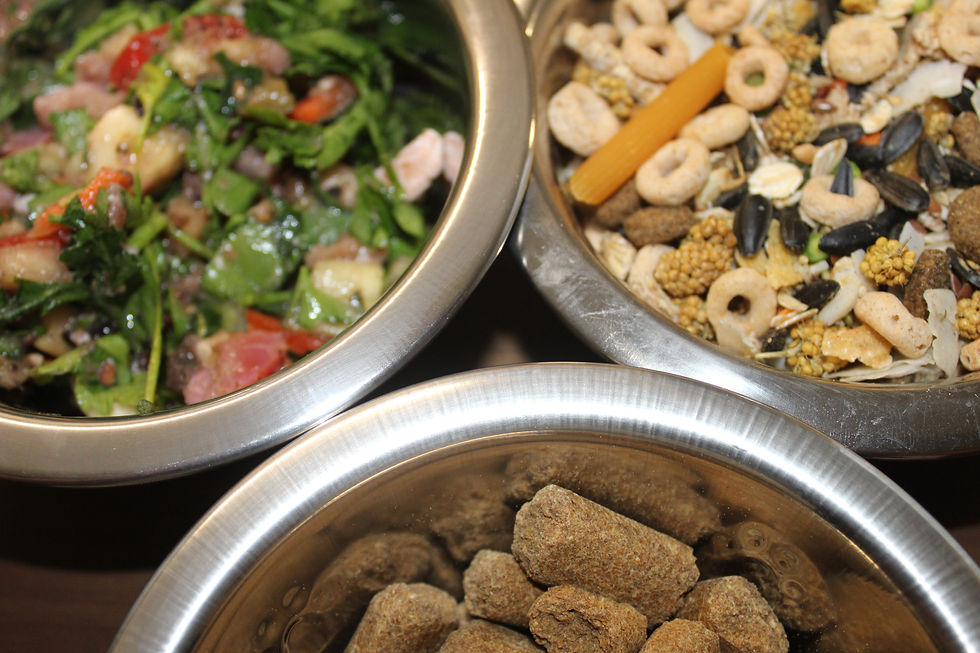Can Rats Eat Bones and What Are the Benefits for Their Diet?
- StormHaven Rattery

- Oct 7, 2025
- 3 min read

Rats are amazing little animals that have become popular pets due to their intelligence, social behavior, and relatively low maintenance needs. If you’re a responsible rat owner, you might be curious about what to feed your furry companions. One question that often comes up is whether rats can eat bones. In this post, we will explore this topic in detail, discussing which bones are safe for rats, their nutritional benefits, and how you can incorporate them into your pet's diet.
Can Rats Eat Bones?
The answer is yes, but there are some important factors to consider. Not all bones are safe for rats; some present risks to their health. Knowing which bones can be safely given and how to prepare them is vital for your pet’s safety and well-being.
Types of Bones Safe for Rats
Lightly boiled Bones: Lightly boiled bones are generally safer than cooked bones. Cooking makes bones brittle, which can lead to splintering and potential harm to your rat's digestive system. Lightly boiled beef or pork bones, are safer and less likely to splinter. Chicken bones are more likely to splinter and should be used with caution.
Marrow Bones: These are rich in nutrients and provide a good source of fat and protein. For example, a single marrow bone can deliver around 20% of a rat's protein needs for the day. They are larger and offer a great opportunity for rats to gnaw, helping to maintain their dental health.
Cartilage: While it isn't a bone per se, cartilage is a safe and nutritious alternative. Pieces from joints are softer and easier to chew on, making them ideal for your pet.
Bones to Avoid
Cooked Bones: These can splinter and create serious risks for your rat. Avoid any cooked bones from poultry or any other meats.
Large Bones: Bones that are too big may be difficult for rats to chew. This could potentially lead to choking. Always choose bones that are appropriately sized for your pet. Don't use bones that are to small or to large.
Processed Bones: Avoid bones that have additives or are processed, as they might contain harmful substances.
Nutritional Benefits of Bones for Rats
Incorporating safe bones into your rat's diet can provide several key benefits:
1. Dental Health
Rats have teeth that grow throughout their lives, and chewing on bones can help keep them trim and healthy. Studies show that 70% of pet rats experience dental issues, often due to a lack of proper chewing opportunities. Chewing on bones helps reduce the risk of overgrown teeth, ensuring your rat can eat comfortably.
2. Source of Calcium
Bones are an excellent source of calcium, crucial for strong teeth and bones. For growing or nursing rats, their calcium requirements can increase significantly. Providing bones can help meet these elevated needs.
3. Protein and Fat
Marrow bones, in particular, offer a good source of protein and healthy fats. For instance, a single marrow bone can provide nearly 5 grams of protein. These nutrients boost your rat's energy and support their immune system.
4. Mental Stimulation
Chewing on bones contributes to mental activity for rats. They are intelligent animals that need engagement to stay happy. Bones can serve as both a treat and a brain teaser.
How to Introduce Bones into Your Rat's Diet
If you want to add bones to your rat's diet, here are some essential steps:
1. Start Small
Introduce pieces that are not to small of lightly boiled bone or cartilage first. Watch your rats closely to ensure they chew and digest the bones safely.
2. Supervise Feeding
Always keep an eye on your rats while they chew on bones. This will help you catch any potential choking risks or signs of distress, which can happen if they chew too aggressively.
3. Clean and Prepare Bones
Make sure any bone you offer is clean and free of harmful additives. Rinse thoroughly and boil lightly.
4. Limit Frequency
While bones can offer health benefits, they should not become a primary food source. Bones should be an occasional reward/treat rather than a regular meal .
Final Thoughts
In summary, rats can safely eat bones if they are lightly boiled and the right size. Including bones in your rat's diet can yield substantial benefits, from better dental health to additional calcium intake. However, it's vital to approach this carefully. Avoid cooked and oversized bones that pose health risks.
As an informed rat owner, ensure your pets have a balanced diet that includes nutritious pellets, fresh produce, and occasional protein sources. This balanced approach will help keep your furry friends happy and healthy.
Always supervise your rats during bone chewing and introduce new foods gradually. With these strategies, bones can become a delightful and nutritious part of your pet's diet.



Comments